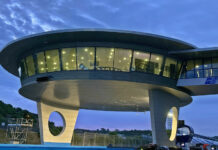FORMULA ONE WILL NOT RETURN IN 2008 TO INDIANAPOLIS MOTOR SPEEDWAY INDIANAPOLIS, Thursday, July 12, 2007 – The United States Grand Prix at the Indianapolis Motor Speedway will not be on the 2008 Formula One schedule after eight consecutive annual events since 2000. After recent meetings, Indianapolis Motor Speedway CEO Tony George and Formula One Management Ltd. CEO Bernie Ecclestone mutually agreed to not schedule Formula One racing in 2008 at Indianapolis. “After several discussions, Bernie Ecclestone and I were unable to agree how to keep Formula One in Indianapolis for the near term,” George said. “However, we have agreed to leave the door open for a potential future date. “It has been a pleasure having the United States Grand Prix at Indianapolis, and I hope that as we approach our Centennial Era at the Indianapolis Motor Speedway, an opportunity might present itself that would allow its return.” The 2007 event was June 17 and was won by British rookie Lewis Hamilton. At the time, George and Ecclestone agreed to a mid-July deadline for a decision about future events. More, from a press release issued by Indianapolis Motor Speedway: UNITED STATES GRAND PRIX ANNOUNCEMENT TRANSCRIPT Tony George Thursday, July 12, 2007, Indianapolis Motor Speedway TONY GEORGE: Today I want to let everyone know that unfortunately, and to my great disappointment, Formula One will not be back next year, in 2008. And beyond that, Bernie and I had several discussions that led us to this decision and announcement, but we did agree it was prudent to try to leave the door open for the future. With that, the near-term communication is that Formula One will not be back next year, but it’s my sincere hope that we’ll have the opportunity to bring it back in the not-too-distant future. Q: The decision to bring the motorcycle race here, how much flexibility did that allow you to go with a strict number of what you’d be willing to pay, and not necessarily negotiate? GEORGE: The decision to not have a round of the World Championship here next year was considered totally independently of any consideration being given to having a motorcycle race here. It was strictly a business decision and there are a lot of factors that weigh into that, but it was a decision that weighed solely on that. Q: There is precedent for Bernie to not agree to a contract now and then suddenly add an event to the schedule later in the year. Is there a chance a USGP could still happen in 2008 here, or somewhere else in the country? GEORGE: I wouldn’t have any insight as to whether there will be another round scheduled in the U.S. in 2008. I don’t believe there will be, but that would be something that was arrived at without my being involved. I know a preliminary schedule had been released with Indianapolis on it. Again, my hope is for the future that we’ll be able to bring all of the components that are important to a successful event together so that we can one day bring it back here. Q: How far off were the two sides on negotiations, and was the city of Indianapolis willing to offer assistance to bring it back here. GEORGE: There was no discussion to what financial contributions the city of Indianapolis might bring to the relationship. Clearly it’s a business decision, one that we have to consider as an event, and one Bernie has to consider as part of their business and opportunity. Money is a factor. It’s not the only factor, and it has some bearing on the decision. There are a number of things that I believe need to happen for it to be viable. It’s a business opportunity. One, the promoter, in this case Indianapolis Motor Speedway and Formula One, has to provide leadership and a working relationship that includes a national broadcast partner, a title sponsor that will actively embrace and support the event, along with a number of other things. Those are important things that really have been lacking. It’s not to say our relationship with Formula One hasn’t been good, because it has. Bernie, personally, has been good to work with. In fact, I’m sure it will be a surprise to many, based on the reputation many consider him to have, he’s a good guy to work with. I believe he’s always been straight-forward and honest with me. I respect him and his decision to do what he has to do for Formula One as a whole. Q: The manufacturers, Honda, Mercedes, Toyota, they really value being in the United States. It seems like – (Autosport Formula One writer) Nigel Roebuck and the boys were hopeful he (Ecclestone) would want to be your partner in this race. Was there any kind of discussion that maybe he would partner with you in this? GEORGE: There was some discussion about that, yes, in the end it’s not what he was wanting to do and not the way we’d prefer to do this, but there was discussion about that. I think the manufacturers are another key element to achieving success. There are, I think, six engine manufacturers, five of which the United States is fairly important to their business. It’s just a matter of all the elements coming together and being able to support and sustain an event here. In the United States, Formula One is not perceived the same way it is around the world, in central Europe, eastern Europe and Asia, and its just a tough dynamic. But I think the future will depend on recognizing the fact that the United States is a bit different, and we’re going to have to figure out how to make it work. Q: Tony, you have worked so hard and invested so much in this facility to bring Formula One here. How disappointed are you personally? GEORGE: Obviously, I am personally disappointed. Eight years ago, it was our intent to host this event on an annual basis. While I still hold hope for the future that we’ll be able to bring it back, its tough to have a hiatus like this, and I view it as such. I’m going to continue to work on this to try to bring it back to the best of my ability as soon as possible. Q: Do you know if you lost out to another country? Another bid? GEORGE: No, I think, again, it’s a business decision for us, for Formula One. They have a lot of opportunities to consider, and I think they feel like they’ve made the fair assessment of this situation and the opportunities. If we’re not on the schedule, there will probably be 18 races and they can go up to 20 races, so it’s not like the music stopped and we didn’t have a seat. We’ll see, we’ll continue to have a dialogue, but it’s not fair to us, it’s not fair to our customers, the loyal core of Formula One fans, to just go on indefinitely on hold while we try to decide if we’re going to have a ticket renewal process, or what, for next year. So we just need to pull back and re-evaluate this situation and see where it goes from here. Q: (Inaudible) GEORGE: That’s hard for me to say because what we’ve seen here the last few years is the core of Formula One fans. I think you could throw a lot at them, and they’re a resilient lot. The challenge is building on that. We started in 2000 with a very successful inaugural event. The second year we were faced with our first challenge, which was run the race two weeks after 9/11. Since then we have been faced with a number of hurdles, which have contributed to our inability to get the kind of traction we had hoped. We thought it would level off after about three years and then start to build, but in that time we had date changes, controversy about a contrived finish with Ferrari, we had the Michelin situation, we had indecision about the date – another date change – and I don’t think it has affected the core. One of the challenges of creating new fans is creating more awareness of Formula One with a consistent, national broadcast exposure is important. I think Speed has always done a great job, and we’ve had network coverage from year to year. But when you consider Formula One on the whole as a world championship, then you want consistent coverage just like any sport wants. Some of those things – having a title sponsor for a while with SAP and losing that – was a factor. And I think it’s important in the future that if we have it, it comes back with a committed title sponsor as part of that. Q: Some of the things you mentioned in combination with Bernie’s ambivalence about being in the United States, how much of that did wear on your patience, to get something done? GEORGE: It didn’t really wear on my patience. It’s not for me to say whether (for) Formula One having a U.S. round of the World Championship is important to the success of Formula One, but certainly it’s a huge market for many of the manufacturers and sponsors involved, many of which would like to see a round in the United States. But I’m not sure it’s the “be all, end all,” so I think a lot of them (sponsors) are using Formula One as a platform for their desire to build their European markets and Asian markets. The United States is a factor, but it’s not the only thing to consider. Q: Do you have a timetable for when you will sit down to talk about future events here? GEORGE: No, no timetable at all. We have some time to give it the proper reflection, and I hope to be able to go to another event this year and continue the dialogue between now and the end of the season. Not having the pressure and letting everyone know what the status is now will probably, if anything, help the process along. Q: Any chance this could be back by 2009, or is that too early to expect? GEORGE: As I sit here today announcing it won’t be back in 2008, that would be my hope. But I think it would be premature to say that, having not had the conversations that need to be take place that it would even be possible in 2009. Q: Would there ever be a scenario where you’d go to the city to talk to them about paying part of the sanctioning fee? GEORGE: I don’t think so. I think the city is willing to consider how they can help the Motor Speedway continue to attract events like Formula One to Indianapolis, and again that may be part of the due diligence as we pursue, as a necessary step in bringing Formula One back. But direct financial contributions, I don’t see that at all. It was interesting, having been involved in the Super Bowl bid process a little bit to see that dynamic, and while it’s not all about money, money is a factor. Right now, there are a lot of countries and organizers that want Formula One in a bad way, and as bad as I want it, it has to be a prudent business decision. And as it does, it has to be a business consideration for Formula One. There is no animosity, and certainly I believe a willingness on both sides to begin a dialogue to see if and when we can bring it back. Q: Just to clarify, has the city ever approached you about assisting financially, or have you approached the city? GEORGE: No. To clarify, no. Q: The motorcycle GP race, is that something that can economically offset the loss of economic impact not having Formula One here? GEORGE: I don’t know. I know, as much as having Formula One has meant to the economic success of this city, I think if we have a motorcycle race, it will substantially be perceived as an international event that bring a diverse audience to this city that it has never seen before. They’re considered separately by us; internally, I never considered that a motorcycle race would take the place of Formula One in the event Formula One never came back to the Speedway. Obviously, if we have a motorcycle race, it’s because we considered it independently and as a fourth event, not a replacement event. Should that come to be, it will be a great opportunity for the city, a city that can pride itself on world-class motorsports events. Q: How much of this decision can be attributed to one factor, the personality of Bernie Ecclestone, that it was a business decision? GEORGE: Bernie really wants to see it stay, uninterrupted, I believe. He is a personality, a character, and he’s a businessman and he’s basing (this on) his years of experience of being successful. He knows he’s got to look at all the opportunities for his business, and this being one of them. A lot of people think of Bernie in a lot of different ways, and I continue to have a great deal of respect for him and don’t feel his personality in any way factored into the decision we mutually agreed on. Q: Do you think you would have had the USGP next if you had just been willing to write a big enough check? GEORGE: I suppose, but again money’s not the only factor. Again, we’re interested in growing this, and I don’t see all the elements being there for us to do that right now. We don’t have a title sponsor in hand, we don’t have the commitment of national TV, and there are other things. We could agree on the date, and that would be great; we could agree on money and that would be great, but there are other things to consider. Q: Tony, this is a business deal, but it is very important for the city, third-largest and brings in a lot of money. How much did that factor in negotiations? GEORGE: I feel bad for the loss of economic impact for the city, but that wasn’t my biggest concern. It’s certainly a factor, and I regret the fact we won’t have it for 2008, but my hope is we’ll be successful in getting that back in the future. Q: At the end of the day, how confident do you feel you’ll be able to get it back here? GEORGE: Probably better than the 50/50 that I thought it would be back in 2008. How much more? I don’t know, maybe 60/40?
Updated: MotoGP May Replace Formula One On Indy’s 2008 Schedule
Updated: MotoGP May Replace Formula One On Indy’s 2008 Schedule
© 2007, Roadracing World Publishing, Inc.






